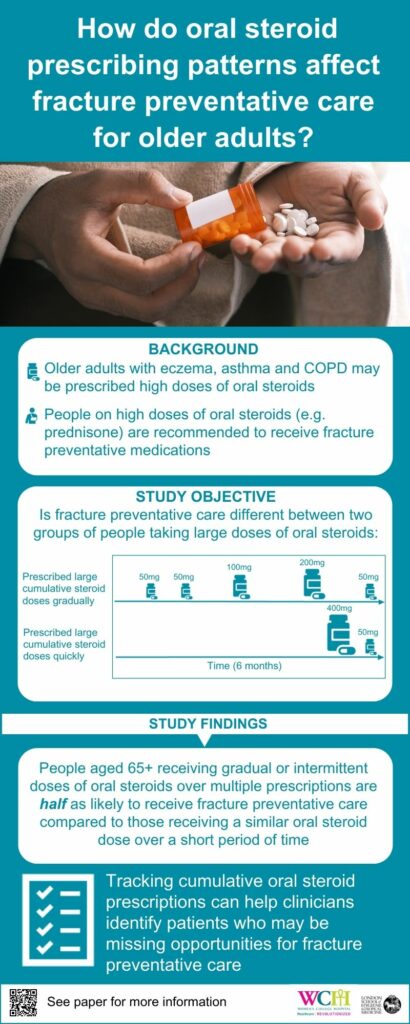
At Women’s College Hospital, our scientists focus on understanding various skin diseases, including atopic dermatitis, psoriasis and skin cancer, and identifying gaps in care. We are also evaluating treatment solutions and developing ways to improve care pathways that can help better patient outcomes in Canada and around the world.
The Skin Investigation Network (SkIN) of Canada is a national research network based at Women’s College Hospital and funded by the Canadian Institutes of Health Research (CIHR). SkIN Canada aims to catalyze high-impact, multicentre skin research that improves the lives of patients with dermatologic conditions.
Atopic Dermatitis
Atopic dermatitis (eczema) is a common, chronic condition that makes the skin red and itchy. Our scientists are investigating the population and patient-level burden of eczema, including its impact on mental health. Our scientists work with international collaborators, including patient organizations, to evaluate how treatment strategies can be optimized to improve eczema outcomes in Canada and around the world. Our Atopic Dermatitis Specialty Clinic provides advanced care, including phototherapy and oral and injectable medications, for adults with severe eczema.
Hidradenitis Suppurativa and Psoriasis
Hidradenitis suppurativa (HS) is a chronic, inflammatory skin disease, predominantly affecting women, that is under-recognized and has an average delay in diagnosis of eight years,. Our scientists are developing solutions to improve care pathways including a new multidisciplinary clinic at Women’s College Hospital, a first of its kind in Canada. The clinic will serve an unmet need within the healthcare system to improve the health and well-being of patient with hidradenitis suppurativa.
Psoriasis affects more than one million Canadians. It is a chronic, immune-mediated disorder with cutaneous and systemic manifestations and substantial negative effects on patients’ quality of life. The pathology of psoriasis is characterized by abnormal skin cells proliferation and immune cell infiltration in all layers of the skin. In collaboration with the Cardio-Rheumatology group at Women’s College Hospital (Dr. Paula Harvey and Dr Lihi Eder), our scientists are developing a unique and novel method of multi-parameter analysis of skin from patients suffering from different forms of psoriasis to yield new and rich information on psoriasis and its variants.
COVID-19, biologics and skin diseases: We evaluate the treatments that affect the immune system (e.g. biologics) in patients with severe skin diseases (psoriasis and HS) on COVID-19 immune responses (IMPACT).
Skin Cancer
Skin cancer, including melanoma, basal cell, squamous cell and Merkel cell carcinoma, is the most common type of cancer in Canada. Our scientists study risk factors and patterns of care for these cancers to identify gaps and propose solutions to improve outcomes for skin cancer patients. This includes work to understand how to prevent and treat skin cancers in organ transplant recipients, who are at particularly high risk of developing and dying from skin cancer.
Scientists & Their Teams
- Karen Lau, Research coordinator
- Alexa Bowie, Research Assistant
- Stephanie Jewell, Research Coordinator
- Nihilkumar Dobariya, Research Coordinator
- Josephine Salib, Network Coordinator for SkIN Canada
- Marsida Stafa, Research Assistant
- Zexing Song, PhD student
- Justin Pymento, MSc student
- David Croitoru, Dermatology Resident and Graduate Student
- Erika Lee, Research Fellow
- Lily Acheampong, Research Assistant
- Stephane Caucheteux, Senior Research Associate
- Saeed Khalili, Lab Technician
Living network meta-analysis of systemic treatments for atopic dermatitis
Canadian Atopic dermatitis Cohort for Translational Immunology and Imaging (CACTI): a cohort study evaluating advanced treatments for atopic dermatitis, including a randomized controlled trial comparing two types of phototherapy.
Immune response after COVID-19 vaccination during maintenance therapy in immune-mediated inflammatory diseases: an observational cohort study (IMPACT).
Understanding IL-23-mediated inflammation in Plaque Psoriasis using Tissue Imaging Mass Cytometry (IMC).
Tissue Imaging Mass Cytometry to Decipher Psoriasis Inflammation in Plaque and Paradoxical Psoriasis.
Safety immUnogenicity of Covid-19 vaCcines in systEmic immunE mediated inflammatory Diseases (SUCCEED).
Skin cancer prevention with nicotinamide in solid organ transplant recipients (SPRINTR trial)
Patterns of care and outcomes for early stage melanoma and Merkel cell carcinoma
Artificial intelligence to track population-based incidence of basal and squamous cell carcinoma
Study Spotlight
Background:
- People with eczema, asthma and COPD are often treated with oral steroids (e.g., prednisone).
- High cumulative doses of oral steroids put people at risk for fractures, so fracture preventive care is recommended for those patients.
- Eczema, asthma and COPD are often characterized by intermittent flares, and so steroids are often prescribed in intermittent bursts to treat those flares.
- When steroids are prescribed intermittently, as opposed to as part of a long-term plan, fracture prevention may be missed.
Study Findings:
- Dr. Drucker and team found that among older adults in Ontario and the UK with eczema, asthma and COPD, being prescribed large cumulative doses of oral steroids intermittently (compared to large cumulative doses prescribed steadily spread over time) was associated with approximately half the rates of being prescribed fracture prevention.
- As a result, physicians might miss opportunities to prescribe fracture prevention medications if they think of a short burst of oral steroids to treat a flare in isolation. Those short bursts can add up and be difficult to keep track of in the context of a large cumulative dose.
- Physicians should be more aware of this issue and consider fracture prevention in people who are receiving high doses of steroids in discontinuous bursts.

Notable Publications
https://pubmed.ncbi.nlm.nih.gov/33846199/
https://pubmed.ncbi.nlm.nih.gov/32320001/
https://pubmed.ncbi.nlm.nih.gov/34787649/
Naderi-Azad S, Croitoru D, Khalili S, Eder L, Piguet V. Research Techniques Made Simple: Experimental Methodology for Imaging Mass Cytometry. J Invest Dermatol. 2021 Mar;141(3):467-473
Frew JW, Marzano AV, Wolk K, Join-Lambert O, Alavi A, Lowes MA, Piguet V. A Systematic Review of Promising Therapeutic Targets in Hidradenitis Suppurativa: A Critical Evaluation of Mechanistic and Clinical Relevance. J Invest Dermatol. 2020 Sep 9;141(2):316-324
Kendall TJ, Robinson M, Brierley DJ, Lim SJ, O’Connor DJ, Shaaban AM, Lewis I, Chan A-W, Harrison DJ, SPIRIT-Path group. Guidelines for cellular and molecular pathology content in clinical trial protocols: the SPIRIT-Path extension. The Lancet Oncology. 2021 Oct 22;22(10):e435-e445. Impact Factor 41.3. Coauthor or Collaborator.
Tang E, Fung K, Chan A-W. Incidence and mortality rates of keratinocyte carcinoma from 1998-2017: a population-based study of sex differences in Ontario, Canada. CMAJ. 2021 Oct 4;193(39):E1516-E1524
Kendall TJ, Robinson M, Brierley DJ, Lim SJ, O’Connor DJ, Shaaban AM, Lewis I, Chan A-W, Harrison DJ, SPIRIT-Path group. Guidelines for cellular and molecular pathology content in clinical trial protocols: the SPIRIT-Path extension. The Lancet Oncology. 2021 Oct 22;22(10):e435-e445. Impact Factor 41.3. Coauthor or Collaborator.
Tang E, Fung K, Chan A-W. Incidence and mortality rates of keratinocyte carcinoma from 1998-2017: a population-based study of sex differences in Ontario, Canada. CMAJ. 2021 Oct 4;193(39):E1516-E1524
Orkin AM, Gill PJ, Ghersi D, Campbell L, Sugarman J, Emsley R, Steg PG, Weijer C, Simes J, Rombey T, Williams HC, Wittes J, Moher D, Richards DP, Kasamon Y, Getz K, Hopewell S, Dickersin K, Wu T, Ayala AP, Schulz KF, Calleja S, Boutron I, Ross JS, Golub RM, Khan KM, Mulrow C, Siegfried N, Heber J, Lee N, Kearney PR, Wanyenze RK, Hróbjartsson A, Williams R, Bhandari N, Jüni P, Chan A-W; CONSERVE Group. Guidelines for Reporting Trial Protocols and Completed Trials Modified Due to the COVID-19 Pandemic and Other Extenuating Circumstances: The CONSERVE 2021 Statement. JAMA. 2021 Jun 21;326(3):257-265
Cruz Rivera S, Liu X, Chan, A-W, Denniston AK, Calvert MJ, SPIRIT-AI and CONSORT-AI Working Group, SPIRIT-AI and CONSORT-AI Steering Group, SPIRIT-AI and CONSORT-AI Consensus Group. Guidelines for clinical trial protocols for interventions involving artificial intelligence: the SPIRIT-AI extension. Nature Med. 2020 Sep 9;26:1351-1363.
Park CK, Dahlke EJ, Fung K, Kitchen J, Austin P, Rochon PA, Chan A-W. Melanoma incidence, stage, and survival after solid organ transplant: A population-based cohort study in Ontario, Canada. J Am Acad Dermatol. 2020 Sep 1;83(3):754-761